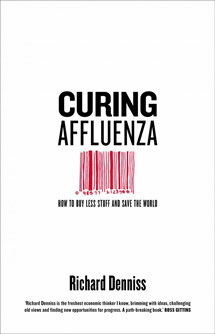Reviewed by Rama Gaind.
By Richard Denniss, Black Inc., $27.99.
 It’s interesting to learn that affluenza is a modern affliction. It’s endemic in western societies, encouraged by those who profit from a culture of ‘exploitation and waster’.
It’s interesting to learn that affluenza is a modern affliction. It’s endemic in western societies, encouraged by those who profit from a culture of ‘exploitation and waster’.
Affluenza is that strange desire we feel to spend money we don’t have to buy things we don’t need to impress people we don’t know.
It leaves us discontented and displeased. This endemic is also leading to staggering social inequality and a world polluted beyond repair. Suffice it to say, it doesn’t have to be this way.
Economist and author Dr Richard Denniss says: “if modern capitalism has reached the point where we are being urged to consume more than we need simply in order to keep things going, then it’s obviously time to stop and think”.
One of the arguments in the book is that far from encouraging efficiency, marks have become the major driver of waste and inefficiency in developed countries.
Simply put, curing affluenza means that we will waste far less time and far fewer resources, and in turn make far more of the things we really want more of.
So, what’s the antidote? Now you can learn how to buy less stuff and save the world.
As Denniss puts it: the “purpose of this book is to help widen our range of options and, I hope, make people more confident in demanding the changes thy want”.
The chapters contain “case studies, written by diverse authors that show how individuals and communities have called for, and delivered, change: in their community, in their country and across the globe”. There are alternatives, and the more people demand them, the faster change will occur.
“We don’t just need to ‘reframe the debate; or ‘reform’ our policies. We need to fundamentally reshape the economy. History says it’s been done before, and voters around the world clearly believe that it is time we did it again.”
If people maintained and repaired their possessions, the world economy and the impact of human activity on the environment would be transformed
We have been trained to love things not for their material function, but for the symbolic act of acquiring and possessing them.











